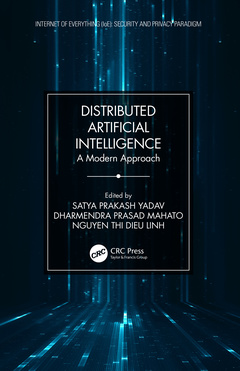Distributed Artificial Intelligence A Modern Approach Internet of Everything (IoE) Series

Distributed Artificial Intelligence (DAI) came to existence as an approach for solving complex learning, planning, and decision-making problems. When we talk about decision making, there may be some meta-heuristic methods where the problem solving may resemble like operation research. But exactly, it is not related completely to management research. The text examines representing and using organizational knowledge in DAI systems, dynamics of computational ecosystems, and communication-free interactions among rational agents. This publication takes a look at conflict-resolution strategies for nonhierarchical distributed agents, constraint-directed negotiation of resource allocations, and plans for multiple agents.
Topics included plan verification, generation, and execution, negotiation operators, representation, network management problem, and conflict-resolution paradigms. The manuscript elaborates on negotiating task decomposition and allocation using partial global planning and mechanisms for assessing nonlocal impact of local decisions in distributed planning.
The book will attract researchers and practitioners who are working in management and computer science, and industry persons in need of a beginner to advanced understanding of the basic and advanced concepts.
1. What is DAI? 2. Intelligent Agents. 3. Problem Solving Using DAI. 4. Beyond Classical Search. 5. Adversarial Search. 6. Constraints Satisfaction Problem. 7. Decision Procedures. 8. Cooperation through Communication in a Distributed Problem-Solving Network. 9. Instantiating Descriptions of Organizational Structures. 10. The Architecture of the Agora Environment.
11. Test Beds for Distributed AI Research. 12. Frameworks for Real-Time Distributed Cooperative Problem Solving. 13. A Connectionist Encoding of Sematic Networks. 14. Examples of Context Free Recognizers. 15. DAI for Document Retrieval.
16. Manufacturing Experience with the Contract Net. 17. Participant Systems. 18. Distributed Artificial Intelligence: An Annotated Bibliography.
Satya Prakash Yadav is currently the faculty of the Information Technology Department, ABES Institute of Technology (ABESIT), Ghaziabad (India). He has submitted his Ph.D. thesis entitled "Fusion of Medical Images in Wavelet Domain" to Dr. A.P.J. Abdul Kalam Technical University (AKTU) (formerly UPTU). A seasoned academician having more than 12 years of experience, he has published three books (Programming in C, Programming in C++ and Blockchain and Cryptocurrency) under I.K. International Publishing House Pvt. Ltd. He has undergone industrial training programs during which he was involved in live projects with companies in the areas of SAP, Railway Traffic Management Systems, and Visual Vehicles Counter and Classification (used in the Metro rail network design). He is an alumnus of Netaji Subhas Institute of Technology (NSIT), Delhi University. A prolific writer, Mr. Satya Prakash Yadav has published two patents and authored many research papers in web of science indexed journals. Additionally, he has presented research papers at many conferences in the areas of Image Processing and Programming, such C, Data Structure, C++, C# and Java. Also, he is a lead editor in Science Publishing Group,(U.S.A), and Eureka Journals , Pune ( India).
Dharmendra Prasad Mahato is currently an assistant professor in the Department of Computer Science and Engineering at National Institute of Technology Hamirpur, Himachal Pradesh, India. He received his AMIETE degree in Computer Science and Engineering with distinction from the Institute of Electronics and Telecommunication Engineers (IETE), India, in 2011. He received his Master of Technology in Computer Science and Engineering from Atal Bihari Vajpayee-Indian Institute of Information Technology and Management Gwalior in 2013 and Ph.D. in Computer Science and Engineering from Indian Institute of Technology (Banaras Hindu University), Varanasi, India, in January 2018. His research interests include distribute
Date de parution : 12-2020
15.6x23.4 cm
Thèmes de Distributed Artificial Intelligence :
Mots-clés :
Distributed Artificial Intelligence; Industry 4.0; Multi-agent Systems; Big Data; Ma; Cyber Security; DPS; Media & Mass Communication; Blockchain Technology; Behavior Science; Vice Versa; Pattern Recognition; Smart Contracts; Conflict-resolution paradigms; Consensus Algorithm; Computational ecosystems; DNN; Communication-free interactions; Hash Code; Decision-making problems; Software Agents; Machine Learning; ABE; VANETs; Road Segments; FIPA Standard; Document Retrieval; Packet Delivery Rate; Linguistic Parser; DSS Model; Packet Delivery Ratio; AOSE; IR Framework; Automated Decision Making
